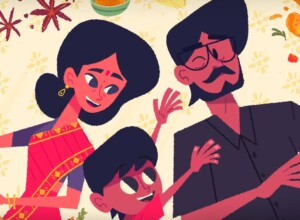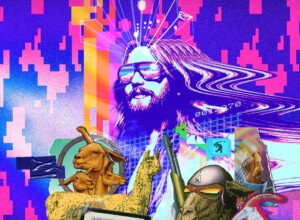More games than ever are taking on the idea – including this year’s Borderlands: The Pre-Sequel! and Assassin’s Creed: Rogue. What is it that’s so compelling about stepping into the bad guy’s shoes?
SPOILER WARNING: Major spoilers for BioShock Infinite, The Last of Us and Prototype
Sometimes it’s about the novelty; reversing the normal set-up can be fun purely for the strangeness of it. It allows developers to explore new kinds of gameplay, as in cult favourite Dungeon Keeper which sees you commanding monsters and building traps to defend a dungeon against heroes, as a twist on classic RPGs.
Asymetrical multiplayer games take this even a step further. Left 4 Dead, Natural Selection and the upcoming Evolve pit you, as a monster, against a team of humans, effectively becoming the villain for their gameplay experience.
These games, however, are just about the trappings of villainy – they don’t aim to explore it as a concept. They feature characters that are comically evil and exaggerated, or else totally mindless, in order to avoid running in to any serious questions of right or wrong.
Increasingly, by contrast, games are using the option to play the villain as a way of allowing the player to deliberately break the rules. Binary good/evil morality systems are extremely popular in modern games, allowing you to choose what kind of person you want to be in that world.
Unfortunately more often than not they consist simply of intermittent choices between saintly virtue and totally senseless malevolence. Do you save the puppy orphanage, or burn it down for no reason?
The interesting thing about the popularity of these systems is that the vast majority of people still don’t make the evil choices. In Infamous: Second Son, for example, only about a quarter of players earned the achievement for completing an evil playthrough, versus over 85 per cent who finished as a good guy (the ten per cent discrepancy is due to people making multiple playthroughs). For many people, it seems, knowing that the evil option is there is transgressive enough – actually taking it is unnecessary. In some way, perhaps, knowing you could become the villain whenever you want makes choosing to be the hero that much more significant.
So why don’t people take the evil option? It’s because too often it’s motiveless – a choice to be evil for its own sake. Taking those options makes the protagonist’s actions impossible to empathise with, despite you being the one that chose them. Villains, especially playable villains, are at their best when they’re relatable – misguided but sympathetic characters doing the wrong thing for the right reasons. Warcraft III‘s Arthas, for example, is a man so desperate to save his people that he is consumed by the very corruption that threatens them. Ultimately he becomes the Lich King, lord of everything he fought to stop, because of his willingness to sacrifice his own humanity for the sake of others.
In fact, one of the most interesting twists on the playable villain is when a game initially presents the main character as a hero, and then slowly reveals them to be not quite what they seem. BioShock Infinite‘s Booker DeWitt at first seems a typical grizzled protagonist, a man on a mission to save a damsel in distress. As the game goes on, despite Booker’s present behaviour actually becoming more and more virtuous, his past is revealed to be a tapestry of horrifying acts driven by a profound self-hatred. There is so much evil in Booker, in fact, that the villain is eventually revealed to be an alternate version of him. The Booker we play is just one incarnation of a man so destructive that he must ultimately be erased from existence.
As in the original BioShock, the central point of Infinite‘s story is to explore the player’s relationship to the games they play. Booker’s dark past gives context to violent and disruptive acts the player is asked to commit over the course of the game – acts that in any other game would be par for the course and not commented upon.
Body-horror open-world game Prototype takes this idea even further. You play Alex Mercer, a scientist seemingly saved from death by a bizarre genetically-modified virus that gives him super powers, but robs him of his memories. In cut-scenes, Mercer appears to be a good man, out to protect his family and save the city from further infection; in gameplay, the player is encouraged to indulge their violent tendencies, eating civilians to regain health, throwing cars around and dismembering enemy soldiers in increasingly monstrous ways.
At first this just seems like an unintentional clash of story and gameplay, but then you start to find hints that Mercer isn’t necessarily what he seems. Clues point to him perhaps being the one who unleashed the viruses ravaging the city in the first place.
Then, in a final twist, it’s revealed that Mercer isn’t Mercer at all – he’s just the virus. The original Mercer did release the virus, but he really did die in the process. The person you’re playing is just a form the virus has given itself, constructed in the image of the nearest body and elevated to sentience with bits and pieces of his mind and memories.
The dissonance between the story and the gameplay turns out to be intentional – you’re not a good man inexplicably doing evil acts, you’re a monster intermittently attempting to be human. Players inevitably approach open-worlds in games as psychopaths. Prototype chooses to make that a part of the story.
Perhaps the most lauded video game narrative of recent years is that of The Last of Us, a character-driven game of post-apocalyptic survival. Main character Joel is, morally, an interesting case, and I believe that his purpose in the game in a lot of ways is to make the player explore their own values. Objectively, he does bad things. He’s ruthless and violent, and as with Booker, the game hints at a worse past. Whether or not he’s a bad person is a question raised frequently throughout the game, and your answer depends on whether you agree with his motivations.
All Joel cares about is survival – his own survival, or the survival of those he loves. He’ll do anything to secure it. Over the course of the game, the player witnesses his growing affection for his companion Ellie, who becomes a surrogate for his long-dead daughter, and through excellent writing and performances, the player too comes to feel strongly for her. The game ends with Joel’s choice that he values her over anything else, and ultimately he dooms the human race and betrays her trust to keep her safe.
When I saw the ending, I was horrified at his actions, and to me he is absolutely a villain. I’ve seen others, however, argue in his defence, claiming that they would have done the same in his shoes. Instead of offering a choice of whether to do a good or evil act, The Last of Us chooses an act for you, and asks you to decide whether it was good or evil. Whichever you feel, you’re in some way changing the nature of the story – placing it as about either redemption, or about a destructive cycle repeating.
For all this talk of social commentary and moral greyness, my own favourite playable villain is actually The Boss from the Saints Row series. What makes him or her (their gender being the player’s choice) so enjoyable to play as isn’t their motivations (invariably selfish) or their actions (escalatingly explosive and insane), but the fact that they seem to be having just as much fun as you are. The good guy struggling against overwhelming darkness who cracks jokes during a gunfight seems inappropriately sociopathic – The Boss embraces sociopathy, and the freedom to laugh at whatever they like. There’s a paradoxical innocence to the glee of a character that has no desire to justify anything they do to the outside world, and somehow it makes them more endearing to me than any virtuous-but-dour-faced hero you can name.
Maybe that’s what it’s all about. If video games are for escapism, perhaps playing the bad guy is the ultimate expression of that. They get to break all the rules you never would, do all the things you’d be afraid to do, and look cool doing it. We dream of being heroes, saving the day – but part of us also wants to embrace chaos and, frankly, blow something up. But only within the safe, ordered confines of a virtual world, of course.






